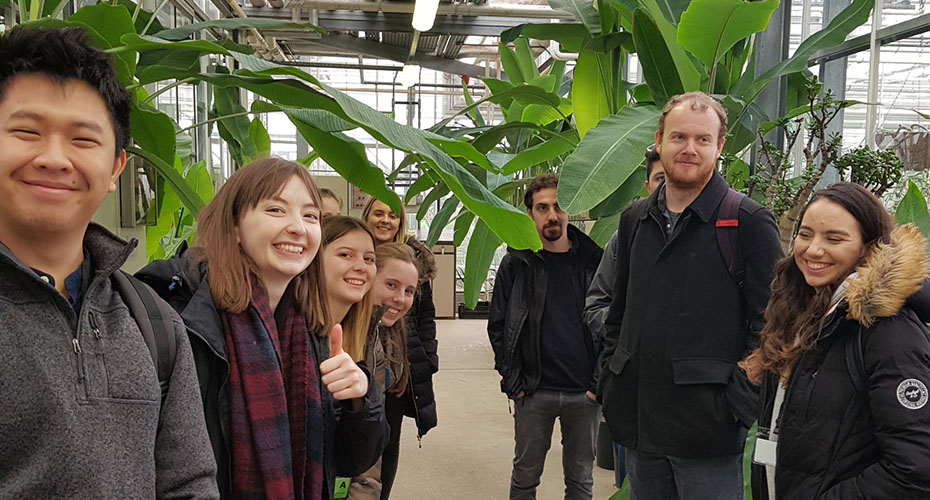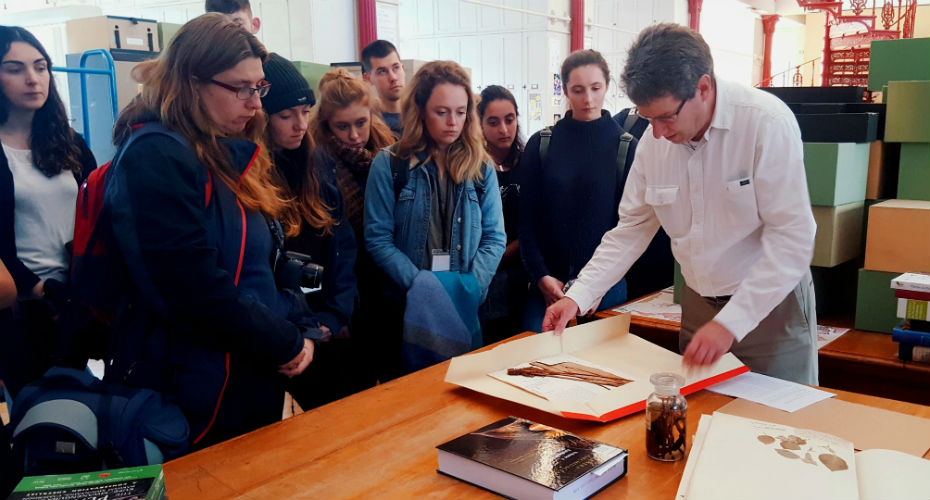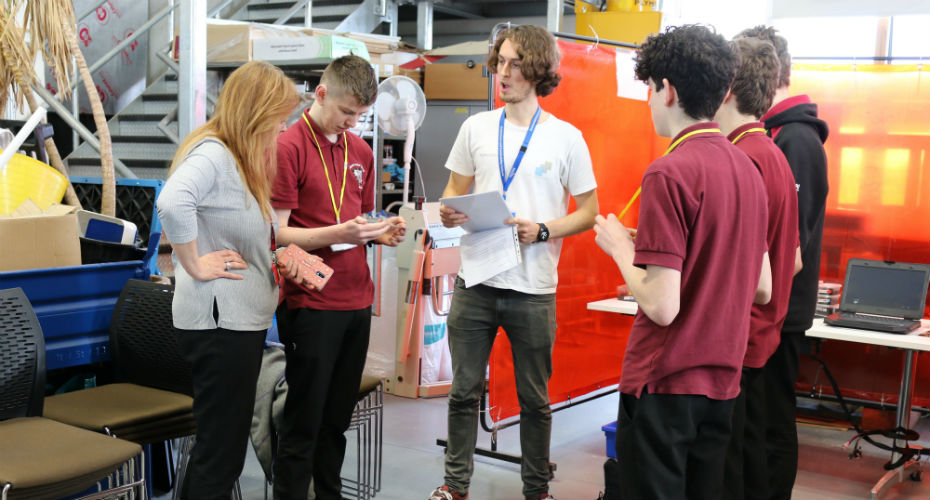
View our Graduates in Focus 2023.
View our Student Newsletter 2021
Education
While the ESI is an institute built around research, education plays an important role in what we do. Our staff’s roles in TEF Gold level teaching and world class research have a symbiotic relationship, each feeding and benefiting the other.
Academics from the ESI teach onto over 60 modules across the Penryn Campus. These include degree and post-graduate taught courses across Applied Data Science, Biosciences, Business, Geography, Mining, Politics and Renewable Energy.
View all the interdisciplinary Masters degrees here at the University of Exeter, Cornwall, on our Graduate School of Environment and Sustainability webpage.
The ESI supports ten of the University’s interdisciplinary Masters programmes:
MSc Sustainable Development
The MSc in Sustainable Development takes a holistic and interdisciplinary approach to exploring the economic, environmental, and social issues surrounding sustainability policy. It takes a practical and problem-based approach to learning, focusing on both the study of sustainable development and its implementation in a range of professional contexts. It balances theory and its application to explore the outcomes of recent policy making, engaging in applied analysis of international policies, including the United Nations Sustainable Development Goals. Optional modules allow students to cover wider debates in fields of change, energy, human health, wellbeing and environmental governance.
MSc in Mining Environmental Management
Mining is necessary for the production of goods, for economic growth and employability, but in many cases it comes with an environmental cost. The work of geoscientists with specialist knowledge in theory and technologies in environmental management before, during and after mining is essential for reducing the impacts of this cost.
This MSc programme provides students with training in the management, remediation and mitigation of the environmental impacts of mining.
Most high-grade orebodies have already been exploited, and contemporary mining focuses on the extraction of lower-grade ores with higher volumes of wastes. Trained geoscientists are needed to help mining companies and governments carry out mining as sustainably as possible, and to protect the environment from its potentially negative impacts.
MRes Sustainable Futures
The MRes in Sustainable Futures seeks to produce a new generation of researchers who can address the pressing social issues of sustainability in the face of a growing global population and rapid environmental change. Through a broad interdisciplinary approach, gain an understanding of the economics, law, politics and psychology of sustainability, as well as the geography and demographics of those affected. The programme will prepare you for a career as a professional researcher, in either academic or non-academic environments, with core training in interdisciplinary social scientific philosophy, epistemology, methodology and analysis. Through a range of optional modules you will apply key concepts and skills to contemporary topics of enquiry in sustainable futures.
MSc Applied Data Science (Environment and Sustainability)
This programme equips students with an understanding of state-of-the-art modelling and emergent data science techniques, and how to apply these to challenge-led problems focussed on economic, environmental, and societal issues surrounding sustainability practices and policies. The programme is hosted by the Environment and Sustainability Institute, where students are immersed in the institute's cutting-edge research on problems of environmental change, with opportunities to work with industry, charities and the public sector. With key data analytic skills and an understanding of sustainable development principles, two top priorities for many industries and many public and non-governmental organisations, the national and international demand for graduates of this programme will continue to grow.
MSc Applied Data Science and Modelling
This programme provides students with an understanding of and confidence in using real-world data and mathematical models to address the big societal issues of the 21st Century. This is an interdisciplinary and outward facing programme run by the department of Mathematics in collaboration with science and engineering, which will encourage and support students to collaborate with industry, charities or public sector organisations. Through hands-on solution-focussed learning, in collaboration with internationally renowned investigators at the university's Environment and Sustainability Institute, European Centre for Environment and Human Health, and Centre for Ecology and Conservation, students will gain skills and experience and so be able to succeed in the fast growing data analytics sectors, particularly in relation to health, energy and environment challenges.
MSc Applied Data Science (Renewable Energy)
Become immersed in the 'Big Data revolution' and develop state-of-the-art data science and artificial intelligence skills alongside expertise in emerging renewable technologies. This interdisciplinary programme is run jointly by the departments of Mathematics and Renewable Energy. Designed in collaboration with internationally renowned researchers and industrial partners, students will benefit from research-led teaching, practical examples and hands-on activities using modern scientific computing software, the hub for data-intensive science and artificial intelligence provided by the Institute of Data Science and Artificial Intelligence, a new state-of-the-art Renewable Energy Engineering Facility, and the interdisciplinary climate of the university's Environment and Sustainability Institute. Graduates will develop sought-after, discipline-transcending skills needed to succeed in the fast growing data analytics sectors, alongside specialist knowledge of value to the growing renewable energy sector.
MSc Applied Data Science (Ecology and Evolution)
Students of this programme develop an expertise of data scientific methods in ecology, evolution, conservation, biodiversity, and epidemiology. This interdisciplinary programme is run jointly by the mathematicians and life scientists from the university's Environment and Sustainability Institute, the Institute of Data Science and Artificial Intelligence, and the Centre for Ecology and Conservation. Students are exposed to a wide variety of data and data analytics approaches, drawing on cutting-edge and internationally renowned research, and will be supported and encouraged to collaborate with industry, charities, and the public sector. Through hands-on solution-focussed learning, students will gain the skills and experience needed to succeed in the fast growing expansion of data analytics in ecology and evolution.
MSc Renewable Energy Engineering
This programme is designed to develop a critical awareness of the engineering challenges, and their solutions, posed by a rapidly changing global energy landscape. It will provide you with the skills and knowledge to become an in-demand engineer in the renewable energy sector, with the right multidisciplinary skill-set to pioneer the design, build and management of its infrastructure. You will develop an ability to assess renewable energy resources, design appropriate renewable energy systems, evaluate the performance of these systems and provide a clear understanding of the impact that renewable energy development has on our existing energy system. You will also benefit from our dedicated workshop – the Renewable Energy Engineering Facility (REEF) - purpose-built to support opportunities in student skills development and hands-on project work. Cornwall is home to some of the best renewable resources in the UK, hosting a wide range of clean energy projects on our doorstep, and making this the ideal place to study these technologies.
MSc Marine and Coastal Sustainability
The MSc Marine and Coastal Sustainability offers an interdisciplinary perspective on the sustainability challenges facing oceans, seas and coasts. Core modules examine the interlinked nature of social and ecological systems, considering how marine resources contribute to people’s wellbeing and livelihoods, how people effect and are impacted by environmental change, and the potential synergies and trade-offs in balancing social and environmental objectives. Optional modules offer opportunities to draw on other disciplines to gain an understanding of the ecology of marine and coastal systems, the science underpinning their management and conservation, and the role of marine and coastal systems in supporting human health. Alongside these perspectives, training in research skills and transdisciplinary methods will prepare graduates for a wide range of careers in environment and development NGOs, conservation and resource management agencies, sustainability consultancy, government and policy roles, and academic research.
MSc in Evolutionary & Environmental Microbiology
This programme reflects the outstanding and world-class microbiology research ongoing at the Penryn campus and uses a unique evolutionary framework to understand pathogens. The COVID19 pandemic has highlighted the immediate importance of training scientists in understanding the evolutionary processes that underlie pathogen infections, and this programme uniquely fills this void. The programme includes a research project at a Penryn microbiology research group of choice, and taught modules covering evolutionary microbiology, AMR transmission in microbial communities, AMR in the environment, bacteria-phage interactions, advanced statistics, new antimicrobial approaches, genomics of infectious diseases, and molecular and evolutionary aspects of host-pathogen interactions. The target audience for this programme would be a broad range of biology, microbiology and zoology graduates, medical science graduates and health care professionals. Graduates of this programme will be in a strong position to move into PGR studies or into employment in governmental organisations, in medical research laboratories and the NHS, and in industry.




